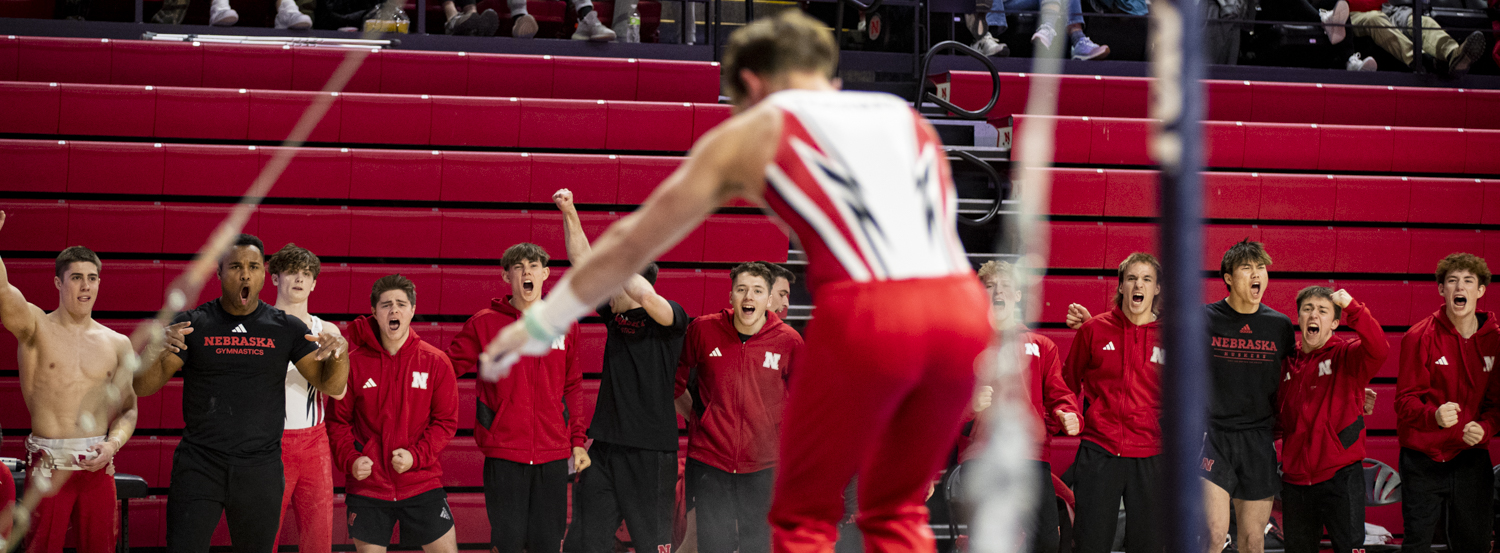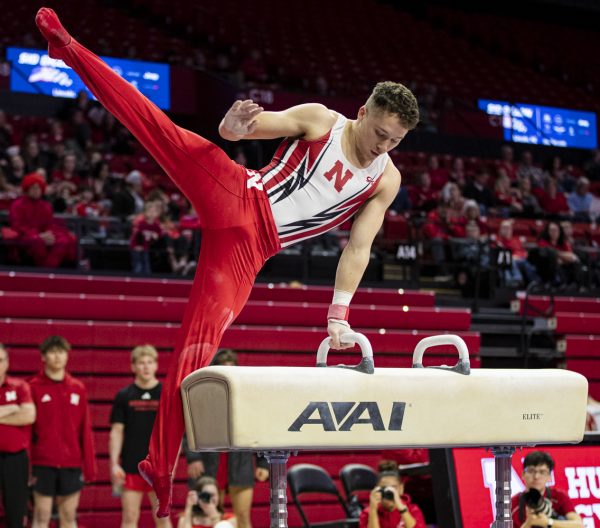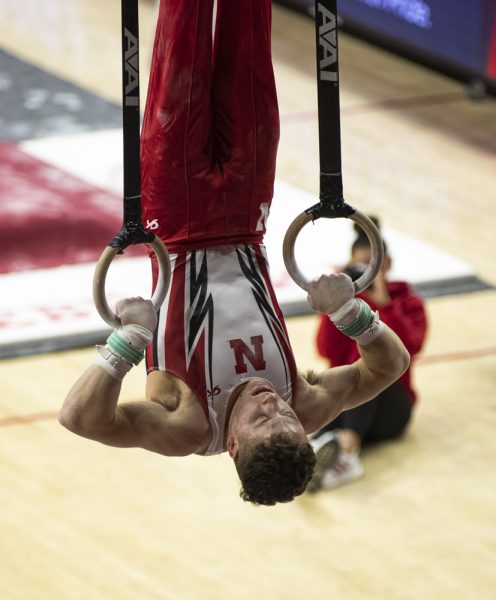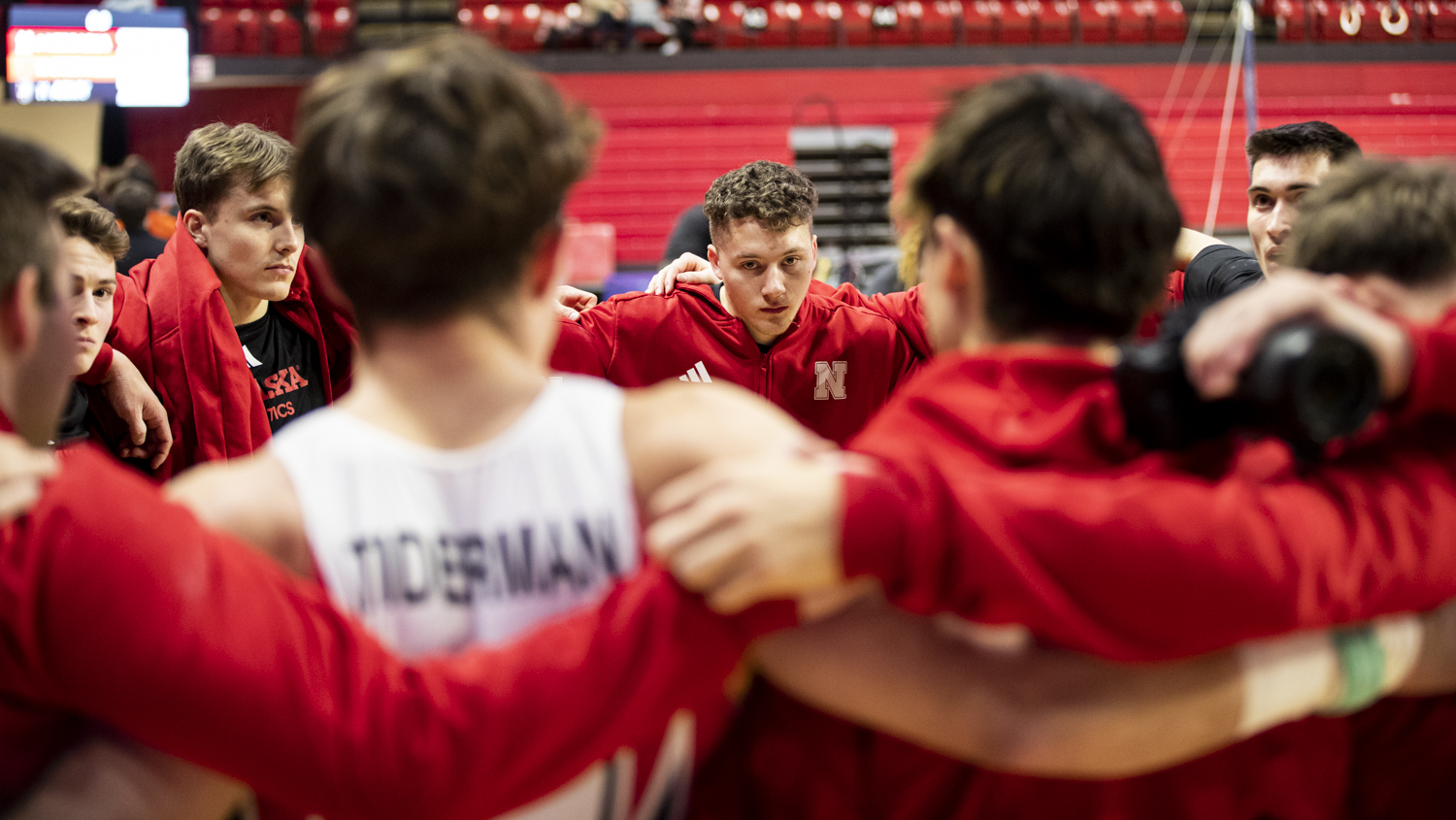What was an unusual phone push notification became an odd meeting at Carver-Hawkeye Arena, which in a matter of minutes became the official death knell of four University of Iowa varsity sports.
Four years after former athletics director Gary Barta announced the University of Iowa was cutting four UI varsity sports, The Daily Iowan searched for the student-athletes whose NCAA careers were forced to move elsewhere or were stopped altogether. This story is the first of a three-part series documenting the lives of some of these athletes since that point, in which DI sports reporter Matt McGowan explores what the future of their careers looked like, and how the UI has fared since cutting these sports.
In the heat of the COVID campus shutdown, student-athletes and coaches of Hawkeye men’s gymnastics, tennis, and both men’s and women’s swimming and diving received word on Aug. 21, 2020, of an urgent meeting at the practice gyms inside Carver-Hawkeye Arena later that day.
Ten days prior, the Big Ten and PAC-12 conferences postponed all of their fall sports, including football, to the spring season. Meanwhile, the three other Power Five conferences affirmed football would occur that fall. In-person classes were set to start on Aug. 24, 2020, but many athletes had been training on campus in advance.
Learn more:
For Zac Tiderman, then a first-year gymnast in the Black and Gold, the lack of athletic department officials in the room for the first few minutes cast a net of unease for the then-masked-up athletes, leaving them warily glancing at one another.
“‘Something’s not right here,’” he recalled thinking.
The intense silence was broken when then-athletics director Gary Barta entered the room. Barta announced he had good news and bad news: all four sports would compete during the 2020-21 season. The bad news quickly followed: after the season ended, those sports would cease to exist at Iowa.
Barta detailed how student-athletes who still wanted to play at the NCAA level were encouraged to transfer, and those who stayed at the university would still have their scholarships honored through graduation.
After providing the news, Barta then left the room, leaving representatives of the athletics department to field questions.
“It was just sad, I mean everyone was crying,” Tiderman said. “Hopes and dreams were crushed in a matter of minutes, and you were just left there to deal with it.”
In a press release later that day, Barta and then-UI President Bruce Harreld explained the sports were cut primarily to save money, as the pair projected lost revenue of up to $100 million and a $60-75 million deficit that fiscal year because of the postponed fall season. On Sept. 16, 2020, the Big Ten announced it would play football, starting as soon as Oct. 23, but without fans in attendance. Barta said at an Iowa Board of Regents meeting on Sept. 23, 2020 that even with football played in the fall, Iowa would face a “still significant” deficit of $40-60 million. He added that the four cut sports would save $5 million annually.
“A loss of this magnitude will take years to overcome,” Barta and Harreld wrote in the release. “We have a plan to recover, but the journey will be challenging.”

Gymnast Zac Tiderman now
For nearly a minute, Zac Tiderman defied gravity. His hands coated in chalk, the Nebraska fourth-year gymnast looked like a windmill while situated just over nine feet in the air on the high bar — completing 23 rotations. One-handed, two-handed, or making a mid-air leap, Tiderman traversed each flip with a combination of power and grace at a tri-meet on Feb. 17. Off to the side, his teammates stood, arms wrapped around each other’s shoulders, bellowing encouragement with each passing second.
When he finally let go, the Cornhusker soared forward, his arms locked against his sides as he navigated another flip before finally planting his feet on the mat below. Without flinching, Tiderman extended his arms upward in triumph. Above him, the crowd roared its approval, waving green flags to signal the perfect landing. The jumbotron above read, “14.650” — a program record.
Tiderman’s effort proved paramount in helping the Cornhuskers defeat Army West Point and Greenville University in the meet at Lincoln. As of 2024, only 15 NCAA schools offer men’s gymnastics — down from 79 in 1981-1982.
Four years ago, Tiderman never planned on landing in Lincoln in the first place. Nebraska recruited him out of high school, but the gymnast never went on an official visit. Instead, the Wilsonville, Oregon, resident committed to Iowa, where his collegiate career took a turn just weeks into his first year on campus with the announcement from Barta.
Gymnast Reuven Anderson now
Former Iowa gymnast Reuven Anderson doesn’t give up hope, not when he’s responsible for the next generation of the sport he loves.
While Anderson’s own NCAA career was derailed after just two seasons, the now 23-year-old coach doesn’t damper any flames of ambition — the same fire he once felt at Iowa.
One of three coaches for the boys’ team at Mini-Hops Gymnastics Center in Plymouth, Minnesota, Anderson graduated from Iowa in May 2023 with a degree in industrial engineering, but instructing is his full-time job. Back in his home state, Anderson’s gymnasts range in age from 10 to 18.

“‘The odds of this happening are low, and maybe it’s not worth it,’ I don’t want to tell them that,” Anderson said. “Any kid who has that dream, I think should have it. I had that dream, and I worked my butt off to get there.”
As a sophomore in high school, Anderson is quick to point out he was “not the most talented.” But upon graduating from Valencia High School in California in 2019, he found himself with offers from Iowa and Penn State. That year, the Nittany Lions competed in the NCAA Championships while the Hawkeyes narrowly missed out, finishing in seventh place in the NCAA at the end of the regular season.
Even though Anderson’s freshman season was cut short because of the COVID-19 pandemic, the gymnast still took part in every competition for Iowa on the still rings. When the NCAA canceled all spring sports championships on March 12, 2020, Anderson shifted his sights toward the next season.
Making the drive south from Minneapolis on his way to campus that August, Anderson learned of Barta’s announcement. The news sent a jolt through the gymnast’s system, sparking a desire to set unattainable goals for himself.
During that season, Anderson “put a lot of pressure” on himself. He ended up suffering an overuse injury before competitions even began, forcing him to play catch-up as he sought to get back on the still rings, his specialty event.
Even with Anderson sidelined, the team still went 4-2 in the Big Ten and finished third in the conference championship — the best finish in program history since 2006. In the regular-season finale, Iowa hosted Nebraska, which would later finish second in the conference. But that day, the Cornhuskers suffered a narrow defeat of just 0.05 points and were left with a lasting impression.
Sam Phillips is a fourth-year gymnast with the Huskers. Back in his first year on the squad, he bore witness to the Hawkeyes as they made a statement on their home turf.
“It was good to see [Iowa] take [being cut] with grace and say, ‘Hey, a big F-U, we’re going to make it rocking. We’re going to show why we deserved to stay,’” he said.
During that season, Anderson pondered transferring to a different school to continue his NCAA career. His engineering major wouldn’t allow him to transfer to Penn State, and just when he started talking with coaches at Minnesota, the Golden Gophers’ program was also cut.
Even with no outside options, Anderson didn’t want to abandon the sport he’d taken part in since he was 18 months old. Following their final season, Anderson and his Hawkeye teammates began the application to become a member team of the Gymnastics Association of College Teams, GymACT, and were accepted on Oct. 6, 2021.
GymACT
Tiderman, alongside former Iowa teammate and close friend, James Friedman, said they played pivotal roles in creating the team, filling out paperwork and sourcing sponsors. For Friedman, the work was well worth the effort.
“There was no obligation to be in the gym like when you’re a part of an NCAA team,” Friedman said of GymACT. “So we all just wanted to be there and we had a lot of fun.”
With former Iowa gymnast Peyton Hobson filling in as coach for his senior season of college, the Iowa GymACT team competed that spring, practicing in Iowa’s Field House because they operated as a club team under recreation services.

Having this affiliation to the university meant the team would have the option of wearing Iowa gear, a prospect Anderson initially bristled at, but the team worked out a compromise — crafting their own logo, designed by teammate Evan Davis.
“We enjoyed our time [at Iowa] besides Gary Barta and what he did to our program,” Friedman said. “That’s what went into our decision to start over and start our new logo; have it inspired by the Tigerhawk, but it wasn’t the Tigerhawk.”
Apart from the fresh logo, which adorns the team’s website, the squad still wore black and gold, and even the Tigerhawk on some occasions. Anderson said having both distinction and association has the potential for a bright future.
“It was more, like, ‘We have something going on here,’” Anderson said. “I’ll wear the Tigerhawk to show high school kids that they can go to Iowa and have a good experience … Despite a sucky situation and not being able to go for the opportunity of a glamorous Division I title, you still have something that’s good.”
So good, in fact, that the team won the 2022 GymACT National Championship.
Anderson said GymACT participation sometimes meant athletes would have to pay dues, but most funding would come from outside donors. Today, GymACT sports 15 squads across the country and, according to its website, the Iowa team collected more than $6,300 for the 2022 season.
For Friedman and Tiderman, the desire to be back competing in the NCAA proved too strong to ignore. Tiderman had committed to transfer before the debut season, but still participated as the squad won the 2022 national title.
“I had so much invested in the Iowa GymACT team,” Tiderman said. “I really cared for those guys and the program we were trying to start there. So I think it was strange going to the GymACT nationals … I totally invested in the Iowa program not yet ready to move on.”
After the 2022 season, the pair of Oregon-grown gymnasts ventured westward to Nebraska. Now seniors, the two had a preview of what the environment in Lincoln would be like when the Huskers hosted the GymACT team for an exhibition.
While the stands at Bob Devaney Sports Center on Feb. 17 had plenty of empty seats, the supporters made themselves known as soon as the team entered the arena.
“The atmosphere is electric, especially when one of our guys hits a dismount,” Friedman said. “The whole place erupts. It’s loud, and everyone is passionate.”
Just north of where Tiderman and Friedman performed on the Nebraska campus stands the Francis Allen Training Complex, a state-of-the-art 46,000-square-foot practice facility for the men’s and women’s gymnastics squads. The building cost $14.076 million and officially opened on March 6, 2020 – just six days before the season was canceled.
“It was like having a Christmas present for a year-and-a-half and you can’t open it,” Nebraska men’s gymnastics head coach Chuck Chmelka said of the complex. “We got in there for I think four practices and that was that.”
While the timing may have been inconvenient back then, Chmelka has a different perspective today.
“I think if we did not get that [facility] before COVID, then who knows?” the head coach said. “We were very lucky to get that gym then … It’s better for our athletes and the longevity of the sport. [Nebraska] put a great commitment to prove that, ‘Yeah, you guys are going to be around.’ So now we got to go up and do well. I liked that challenge.”
Chmelka has been at the helm in Lincoln for 15 years and worked with four athletic directors, including a sudden change in June 2021 from Bill Moos to Trev Alberts. The head coach said that both men were “adamant” all sports would stay.
In addition to support from the higher-ups is financial stability. For Chmelka, this meant never spending more money than the university allotted. Any money that exceeds how much the program is given would have to be fundraised by the team.
“I’ve never gone over budget,” he said. “You can’t. To me, it’s just bad business. The [administration] doesn’t like that because [college athletics] is a big business.”
As Tiderman and Friedman exited the floor following the Cornhuskers’ victory on Feb. 17, they were each wrapped up in a hug from Army head coach J.D. Reive, their former head coach in Iowa City. Following the Iowa program’s final season, Reive became the general manager of Denver’s GymACT team but was forced to move his family three times before finally finding a home at West Point.
In hindsight, Reive said he never would have left the Hawkeyes had the sport not been cut. Now, all he can do is ponder the hypothetical potential.
“It was a while ago, but I talked to my [former] staff, and they were like, ‘Yeah we’d be so good right now,’” he said with a smile.



